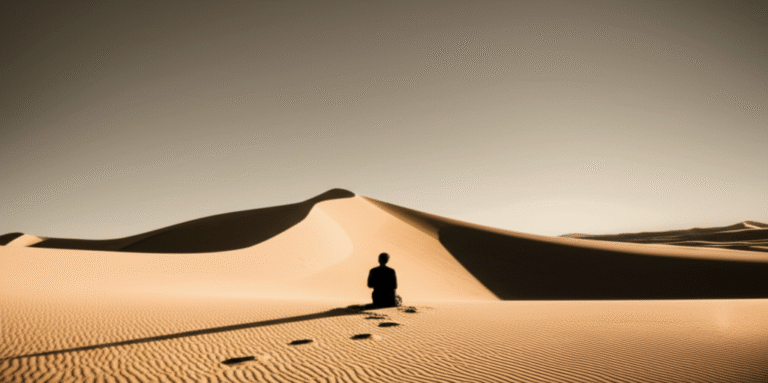The occult symbolism of the desert
The desert as used in the biblical and other spiritual tales is an allegory that is contextual. Like all symbols of dream language it’s applicable on various levels. When we say “dream language”, we mean the same mode of communication that the mind uses to communicate with the quantum construct of being,
The underlying point of the desert symbology is the state of devoid being also known as the “zero state”.
When applied to the individual human entity, the desert is the mental state where the individual is alone with their attention and nothing else. Similar to the meditative state, the desert is the realm of integrity outside of public applause. It’s you vs. you.
When they told you Christ was in the desert for 40 days, it implied a ritual involving an oath, similar to say you quit something you really like for some time. This is a battle with your urges and it’s devoid of outside world influences. It’s a desert of self which means it’s you and you and nothing else.
The temptation of turning stone to bread implies breaking an oath made to self and returning back to your comfort zone. The bread is the pre oath state of comfort and ease, and the stone is the present state of your carrying out your oath, which has become tough…, all within yourself, i.e. the desert.
The symbol of the desert is used in various contexts and the initiate must understand the applicability of this principle in the context for which it is used.
The seals…
Ikuku

You may be aware that your spiritual literature is filled with allegory about “spending time in the desert” which is usually a precursor to a greater state of being.
Before the Promised Land the chosen ones spent time in the desert, before Christ had his super powers he spent time in the desert, john the Baptist was said to retire to the desert to fast. The desert is a common theme in spiritual symbology and the initiate must be aware of the context of its use in the proposition of the message being disseminated.
This “desert” principle is an initiation that is used in all of spiritual practice. Its practical application is adaptable to everyday life as well. It is also known as the Abrahamic effect, where Abraham was told to leave all his loved ones and his home which he was comfortable and venture into the unknown world trusting only the voice in his head. If he did this he was promised greatness. This move by Abraham is consistent with the “desert” symbology in imitate applications.
The desert is the ability to override your thirst: the ability to overcome your personal pleasure as a sacrifice for a greater state of being.
This scarcity in the spiritual world creates value in the physical world. This principle is the governing rod of the Wizard, to rule himself and all things around him through purposeful self-control.
The human urges must be tamed like a wild horse and this initiation happens during periods where the wizard forces himself to evolve by sacrificing his usual pleasures. It’s done alone outside the applause of the crowd. This initiation must be done if spiritual powers are sought.
If the soul can adapt to this principle in life, then respect, honor and greatness becomes the consequences of such self-control. It’s the ultimate sacrifice.
The seals…
Ikuku
7
The principle of the desert is the initiation that creates value for the soul.
It causes the spirits to trust you and the humans to respect you.
In the Christian mythos, Christ finds his power after fasting for 40 days in the desert. What does this mean?
Well these are archetypes to aid in self-knowledge. We can break down variables of this symbolic allegory for the initiate.
The Christ is you; the crystallized soul. The desert is relinquishing all your attachments; a bare and empty feeling which is rightly represented by the aridity of the desert. Indeed to know the true reality of our existence we must relinquish all earthy likes, dislikes and attachments, meaning you must let go of everything completely to know yourself, even your thoughts, Loves and hates, and be empty like the desert. This is where we meet our higher and true self. After all the illusion and mirages of the wakeful existence is stripped away, our true nature reveals itself. This blots out the visible world but illuminates the inner spiritual world, which until then had been hidden from you by your own delusions.
This is the explanation of the Christ in the wilderness or the desert.
After this stage is experienced, you are now reborn into a new world, thus being born again: Born into the invisible world of the spirit.
The seals…
Ikuku
7
If you cannot stay to yourself for too long, you will become a slave to anyone and anything else you encounter.
The principle of solitude which in spiritual writings is known as “the desert” of the soul is the place where those who are worthy to work with higher forces are groomed.
You were told in your scriptures that Christ fasted alone in the “desert”, before the higher forces started to work with him… if he didn’t do it alone, he wouldn’t have been powerful. This is a principle in your world.
This is where the structure of your character is defined. It’s where your lust for attention and human validation is tempered.
It’s not an easy place to be… But if it were easy, every jackass would be an adept.
To stand out and be powerful, you will sacrifice your humanity. You cannot be an animal and a god at the same time.
The seals…
Ikuku
7
